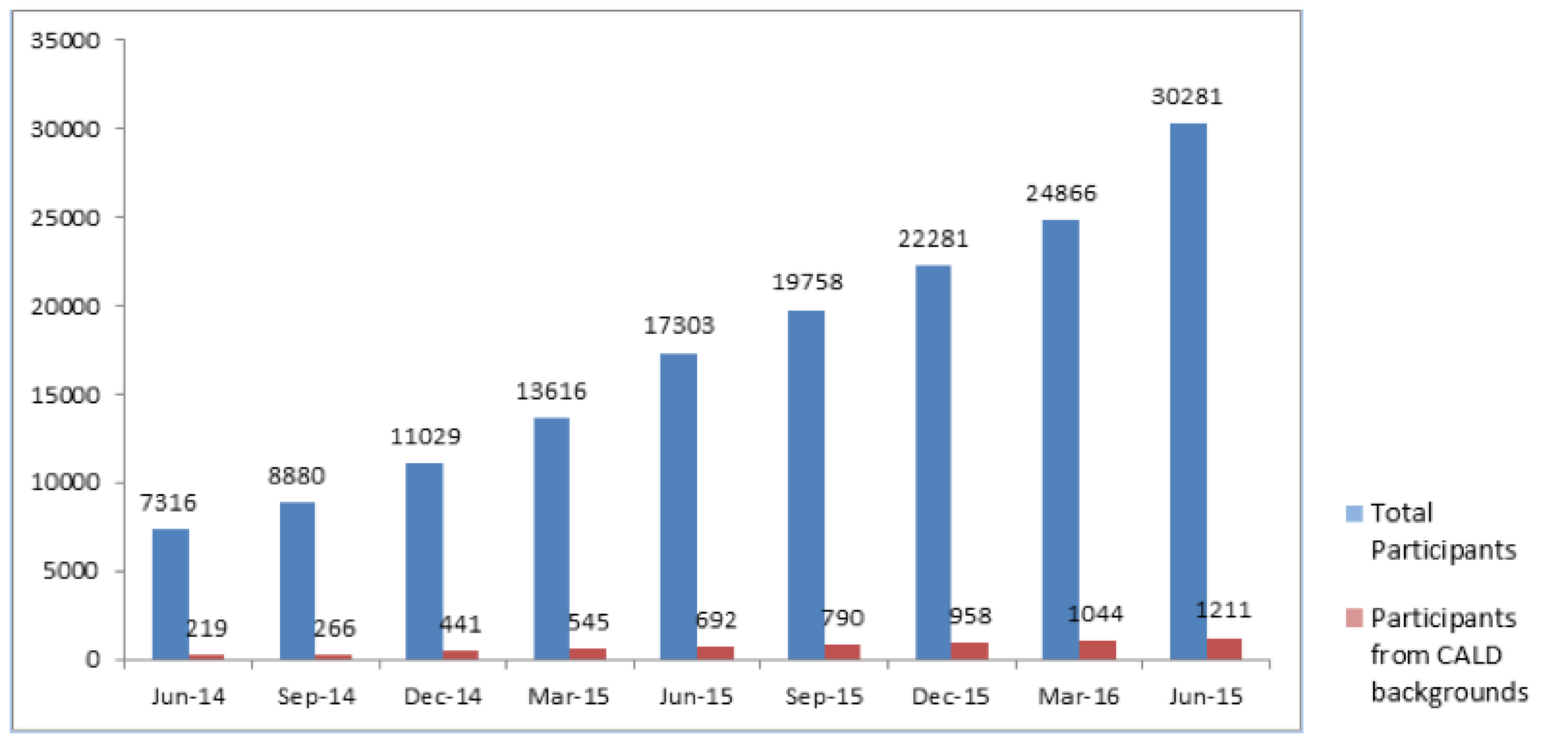Disability, Diversity and the NDIS

The implementation of the NDIS must ensure equity in availability and accessibility of support that will respond to the needs and choices of participants from culturally and linguistically diverse (CALD) backgrounds. It is also imperative that the cultural rights of people with disability are recognised and accommodated within the Scheme.
The available data on the number of people from CALD backgrounds living with disability is currently insufficient. Most researchers use a limited range of diversity indicators, the most common being country of birth. Using country of birth as the indicator of cultural and linguistic diversity is significantly inadequate to the task of identifying cultural and linguistic diversity.[1]
NDIS participants with an approved plan

Data Source: National Disability Insurance Agency Quarterly Report to COAG Disability Reform Council, 30 June 2014 to 31 March 2016.
The NDIS is based on an individualised approach and the concept of consumers exercising ‘choice and control’. Instead of making people fit into fixed support options, NDIS participants are informed consumers making individual choices that can be tailored to their preferences and cultural needs. The positive implications of the Scheme not only affect people with disability but also their family members, carers and the communities that they live in.
The implementation of the NDIS must include strengthening capacity of individuals to navigate the free market and make informed choices about the services that respond to their requirements, including cultural needs.
There is a risk that many participants who have difficulty understanding the processes of the NDIS and limited access to information will not get the same benefits from this social reform as others, creating a system where particular groups are further disadvantaged.
Information about services must reach communities through active engagement. Placing information on a website and expecting consumers to access it will not be sufficient to enable participants in the NDIS to be informed about the services available to them. Other means of communicating including community radio and ethnic print are crucial.
Communities play a vital role in the Scheme in terms of education and assisting the community members to navigate the system. General Practitioners, diagnostic groups and other community organisations can be effective in delivering information about the NDIS to hard-to-reach communities.
Language barriers are a key reason for the minimal participation of CALD communities in the NDIS. Although a majority of people with disability speak English in Australia, there is a considerable number of people with disability who do not speak English at home. To overcome these language barriers, information about the NDIS should be provided in community languages, the use of the Translating and Interpreting Service (TIS) should be actively promoted, and service providers should seek to employ diverse workforces including bilingual and bicultural workers.
Feedback and complaints mechanisms drive quality and improvements to systems. All consumers must be aware of their right to complain and how to access complaints mechanisms. In certain countries making complaints about services is not a cultural norm, thus the promotion of feedback and complaints mechanisms is particularly important for migrants; laws and procedures in their country of origin are likely to be different to those in Australia.
Details of complaints mechanisms should be provided to all participants in the NDIS at the planning stage. There should also be multiple ways of lodging a complaint, including online, over the phone, in writing and in person.
An effective advocacy framework plays a key role in empowering individuals to be proactive self-advocates, assert their rights, and efficiently use existing complaint mechanisms. Peer support and professional advocacy services are also vital in enabling and encouraging people to use the feedback and complaint mechanisms.
The provision of cultural competency training and education is crucial to educate the NDIS workforce about the importance of cultural appropriateness of service delivery. Such training should focus on respecting and understanding cultural values of different cohorts in the society, using culturally appropriate language, behaviour and attire, awareness about the importance of religious observances, etc.
The development of an NDIS CALD Strategy by the National Disability Insurance Agency (NDIA) is a positive development in the right direction. The Information, Linkages and Capacity Building (ILC) Framework also has the potential to assist people from CALD backgrounds to navigate the system. There are a number of disability advocacy and not for profit organisations who run information sessions to educate and empower vulnerable groups of people.
Given the importance of the NDIS as a national social reform, it is imperative to ensure that all Australians, regardless of their cultural or linguistic background, enjoy the benefits of the NDIS.
[1] D. Wadiwel and B. Cooper, Disability and Multiculturalism, Data and the ‘Healthy Migrant’, ‘For those who’ve Come across the Seas, Australian Multicultural Theory’, Edited by A. Jakubowicz and C. Ho. 2013, p. 98.


Join the conversation